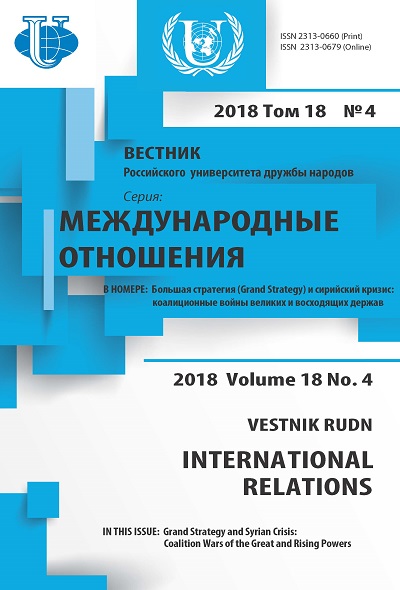Essay on the Phenomenon of the Totalization of War
- Authors: Gadzhiev K.S.1
-
Affiliations:
- The National Research Institute of World Economy and International Relations of the Russian Academy of Sciences named after E.M. Primakov
- Issue: Vol 18, No 4 (2018): Grand Strategy and Syrian Crisis: Coalition Wars of the Great and Rising Powers
- Pages: 859-871
- Section: PEACE AND SECURITY
- URL: https://journals.rudn.ru/international-relations/article/view/20328
- DOI: https://doi.org/10.22363/2313-0660-2018-18-4-859-871
- ID: 20328
Cite item
Full Text
Abstract
A world free from wars and bloody conflicts was the ideal preached at all times by the best minds of mankind. But man fought in the extreme antiquity, he continues to fight in our days and, apparently, will fight while there are human communities. Representations of the types and nature of wars and armies, defense systems, means and methods of force corresponding to changing realities developed, but at all times human communities in various forms and hypostases did not consider the peace to be a supreme good. In many respects the history of mankind itself appears as an uninterrupted series of wars of tribes, peoples, nations, empires, clans, parties, etc. Some tried to subjugate foreign countries and peoples; others thirsted for military glory, while thirds considered it better to die standing, than to live on their knees. In any case, the justifications for wars always found the most convincing, since man, judging by his deeds, acted as if subconsciously guided by the Mephistophelian maxim - there is nothing in the world that is worth pity. It is also not accidental that from the earliest times skeptics never ceased to assert that homo homini lupus est , that is, man is a wolf to man. And from this formula followed another, no less well-known postulate - bellum omnium contra omnes , i.e. war of all against all. However, this is only one side of the history of mankind. The other side is that the state of an absolute, endless war of all against all would be fraught with the prospect of mutual extermination of countries and peoples. The antithesis of war is peace, every war ends in peace, and different tribes, peoples, human societies, and states from the very beginning sought some kind of modus vivendi, as well as the generally accepted and respected norms and rules that ensure it. In the present article, the author analyzes the causes and forms of the totalization of the war for the last century, especially in the context of global trends - globalization, the information and telecommunication revolution.
Keywords
About the authors
Kamaludin Serazhudinovich Gadzhiev
The National Research Institute of World Economy and International Relations of the Russian Academy of Sciences named after E.M. Primakov
Author for correspondence.
Email: gajievks@mail.ru
PhD, Dr. of Science (History), Professor, Chief Researcher of The National Research Institute of World Economy and International Relations of the Russian Academy of Sciences named after E.M. Primakov
References
- Blair, A.A. (2006). Global Alliance for Global Values. London: Foreign Policy Centre. URL: https://fpc.org.uk/wp-content/uploads/2006/09/798.pdf (accessed: 12.09.2018)
- Freedman, L. (2017). The Future of War: A History. 1st ed. NY: Public Affairs
- Gadzhiev, K.S. (2016a). Hybrid Wars in the Modern World. Vlast’, 24(10), 218-223. (in Russian)
- Gadzhiev, K.S. (2016b). Metamorphosis of Conflicts and Wars in the Modern World. International Affairs, 9, 129-145. (in Russian)
- Hoch, М. (2011). Krieg und Politik im 21. Jahrhundert. Aus Politik und Zeitgeschichte. Beilage zur Wochenzeitung Das Parlament. 11 Mai
- Kaldor, M. (2012). New & Old Wars: Organized Violence in a Global Era. 3rd ed. Stanford, California: Stanford University Press
- Kaldor, M. (2018). Global Security Cultures. 1st ed. Cambridge: Polity
- Keeley, L. (1996). War before Civilization. NY: Oxford University Press
- Ludendorff, E. (1936). Waging Total War. Voyenniy zarubezhnik, 4, 10-12. (in Russian)
- McPherson, J. (1988). Battle Cry of Freedom: The Civil War Era. NY: Oxford University Press
- Nye, J. (2004). “Soft Power” and US-European Relations. Free Thought-XXI, September 12. (in Russian)
- Rothkopf, D. (1997). In Praise of Cultural Imperialism. Foreign Policy, Summer, 107, 45-46
- Tsygankov, P.A. (Eds.). (2015). “Hybrid Wars” in a 21st Century Chaotic World. Moscow: Moscow State University publ., 2015. (in Russian)
Supplementary files










